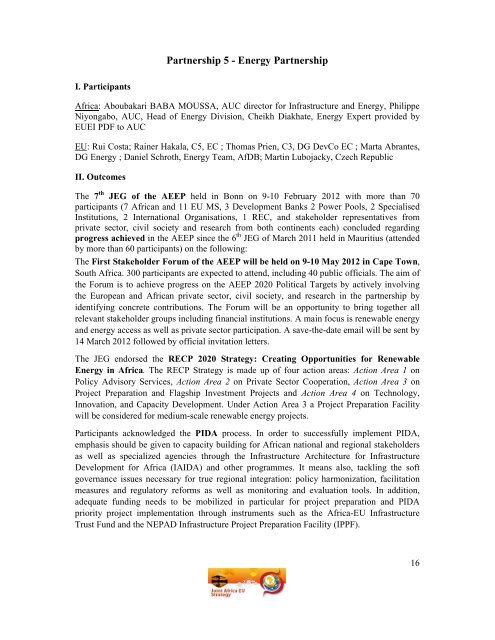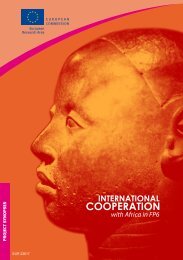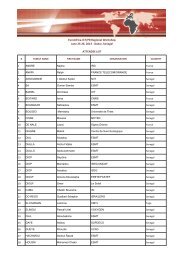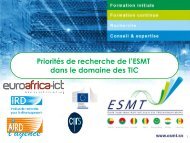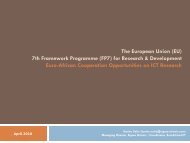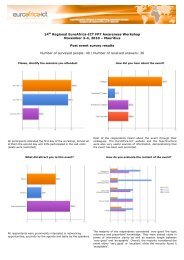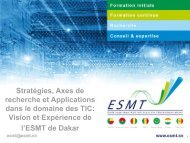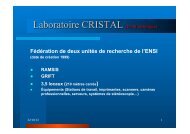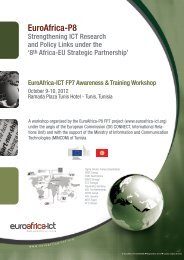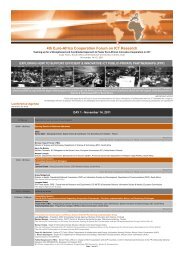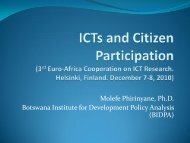Brussels, 8-9 March 2012 - Africa-EU Partnership
Brussels, 8-9 March 2012 - Africa-EU Partnership
Brussels, 8-9 March 2012 - Africa-EU Partnership
Create successful ePaper yourself
Turn your PDF publications into a flip-book with our unique Google optimized e-Paper software.
<strong>Partnership</strong> 5 - Energy <strong>Partnership</strong>I. Participants<strong>Africa</strong>: Aboubakari BABA MOUSSA, AUC director for Infrastructure and Energy, PhilippeNiyongabo, AUC, Head of Energy Division, Cheikh Diakhate, Energy Expert provided by<strong>EU</strong>EI PDF to AUC<strong>EU</strong>: Rui Costa; Rainer Hakala, C5, EC ; Thomas Prien, C3, DG DevCo EC ; Marta Abrantes,DG Energy ; Daniel Schroth, Energy Team, AfDB; Martin Lubojacky, Czech RepublicII. OutcomesThe 7 th JEG of the AEEP held in Bonn on 9-10 February <strong>2012</strong> with more than 70participants (7 <strong>Africa</strong>n and 11 <strong>EU</strong> MS, 3 Development Banks 2 Power Pools, 2 SpecialisedInstitutions, 2 International Organisations, 1 REC, and stakeholder representatives fromprivate sector, civil society and research from both continents each) concluded regardingprogress achieved in the AEEP since the 6 th JEG of <strong>March</strong> 2011 held in Mauritius (attendedby more than 60 participants) on the following:The First Stakeholder Forum of the AEEP will be held on 9-10 May <strong>2012</strong> in Cape Town,South <strong>Africa</strong>. 300 participants are expected to attend, including 40 public officials. The aim ofthe Forum is to achieve progress on the AEEP 2020 Political Targets by actively involvingthe European and <strong>Africa</strong>n private sector, civil society, and research in the partnership byidentifying concrete contributions. The Forum will be an opportunity to bring together allrelevant stakeholder groups including financial institutions. A main focus is renewable energyand energy access as well as private sector participation. A save-the-date email will be sent by14 <strong>March</strong> <strong>2012</strong> followed by official invitation letters.The JEG endorsed the RECP 2020 Strategy: Creating Opportunities for RenewableEnergy in <strong>Africa</strong>. The RECP Strategy is made up of four action areas: Action Area 1 onPolicy Advisory Services, Action Area 2 on Private Sector Cooperation, Action Area 3 onProject Preparation and Flagship Investment Projects and Action Area 4 on Technology,Innovation, and Capacity Development. Under Action Area 3 a Project Preparation Facilitywill be considered for medium-scale renewable energy projects.Participants acknowledged the PIDA process. In order to successfully implement PIDA,emphasis should be given to capacity building for <strong>Africa</strong>n national and regional stakeholdersas well as specialized agencies through the Infrastructure Architecture for InfrastructureDevelopment for <strong>Africa</strong> (IAIDA) and other programmes. It means also, tackling the softgovernance issues necessary for true regional integration: policy harmonization, facilitationmeasures and regulatory reforms as well as monitoring and evaluation tools. In addition,adequate funding needs to be mobilized in particular for project preparation and PIDApriority project implementation through instruments such as the <strong>Africa</strong>-<strong>EU</strong> InfrastructureTrust Fund and the NEPAD Infrastructure Project Preparation Facility (IPPF).16


